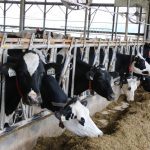Manitoba has been pushing for international review of two proposed North Dakota dairy operations near the Red River. The province says those will add further nutrient loading risk to already-at-risk waterways.


Manitoba government worries two massive proposed dairy projects in North Dakota will add nutrient loading to an already at-risk Lake Winnipeg

The throne speech, which opens the newest legislative session, included plans for healthcare and policing

Manitoba opened a new session in the Legislature with the speech from the throne Nov. 19


New regulations set out how much nitrogen and phosphorus should be coming into Lake Winnipeg

Citizen science initiative aims to help pinpoint sources of Lake Winnipeg’s excess nutrients

Laying blame on farmers fails to capture nuance of the problem

Soil and vegetation may play larger role in excess nutrient runoff, new study suggests